Austin Shirey's Blog
October 30, 2025
Strange & Fantastic #30
Welcome back to Strange & Fantastic, my monthly newsletter where I share updates regarding my writing projects and thoughts on the writing life, as well as sharing book, movie, and music recommendations.
I know I missed sending out a newsletter in September, but it was for good reason—I was working hard on the second draft of my very first novel, Black Coral, and all my creative energy was going into that. And as of this past Tuesday, October 28th, 2025, draft 2 of Black Coral has officially been completed!
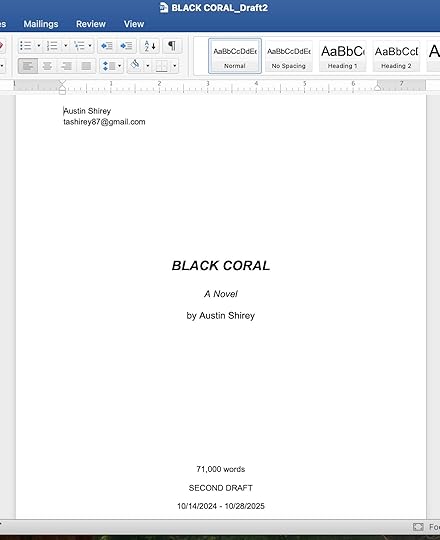
I’m so happy to be finished. I’m proud of myself; I’m proud of the book. It’s the most intensely personal thing I’ve ever written. Including writing the first draft, and completing this second draft, I’ve been actively working on Black Coral for two years now. I’ve given everything to this book, all of my creative attention and energy. I even struggled with some pretty intense mental health stuff while writing it. I’ve left nothing on the table. Heck, I even rewrote half of it twice—from scratch both times! Draft 2 may be only 71,000 words, but I’ve written well over 100,000 words for this thing now that it’s all said and done. It has been an extremely exhausting and rewarding journey getting this novel written, and now, I’m at the point where I’ve got nothing left to give it, and it’s time for some trusted friends to look at it and let me know what they think.
And in the meantime, I will gladly take a well-earned and much-needed break.
“It’s pronounced Fronk-en-steen”I usually spend the evenings in the month of October watching horror films. It’s been my Halloween tradition for the past two or three years now. This year, I’ve been doing things a little different, what with finishing up Black Coral and also rewatching Stranger Things with my wife in preparation for the final season in November/December, watching horror movies here and there instead of dedicating every night to one. I also realized that one of my most anticipated movies of the year, Guillermo del Toro’s long-awaited Frankenstein adaptation, would be releasing early November, so I figured it’d be fun to do a mini Frankenstein movie marathon this October in preparation for the new one.
Like many folks, I was first introduced to Mary Shelley’s Frankenstein in high school. I liked it—I didn’t love it like I loved Dracula, but I still enjoyed it, and even years later I’ve found myself thinking about certain scenes from the novel that lodged themselves in my brain.
Being a film buff and a horror fan, I knew that most, if not all, of the cinematic adaptations of Shelley’s novel were not that faithful to the source material, with del Toro’s adaptation set to (hopefully) be the most faithful we’ve had. Judging from the trailers I’ve seen, and the interviews I’ve read with del Toro, I think we’re in for a treat—especially in terms of the frame story from the novel involving Antartica, which happen to be some of my most favorite scenes in the book.
We’ll have to wait for November to see how del Toro’s version plays out, but for now, here are my thoughts about four of the most famous (and beloved) film adaptations of Mary Shelley’s Frankenstein.
Frankenstein (1931) Directed by James WhaleAmazon Prime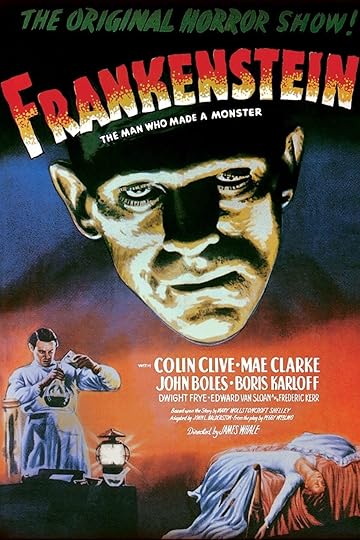 © Universal
© UniversalI’m pretty sure I had seen this one before when I was a kid, but I’m not positive. I felt like I remembered some scenes, but wasn’t sure if they were familiar because they were just clips I’d come across, or if I’d actually already watched the movie. I can definitely see why it’s considered a classic of horror cinema—the set design and costumes and makeup and cinematography are incredible. Boris Karloff’s Creature is iconic. But besides that, it didn’t live up to the hype, at least for me. And besides the central idea of reanimating a creature made from a bunch of corpses, there’s not much of Mary Shelley’s novel in here. Instead, it’s more a kind of bland, sci-fi horror B-movie riff on the book. It’s pretty boring, especially by today’s standards—and I say that as a lover of old B&W cinema. (Please don’t come after me with pitchforks!) Also, the fact that there is no score to the film really, really hurts it, in my opinion. To me, the book is much scarier than this adaptation, and honestly, more interesting. I was expecting more, given how highly regarded this film is—especially by Guillermo del Toro himself. 2 & 1/2 Stars out of 5.
The Bride of Frankenstein (1935)Directed by James WhaleAmazon Prime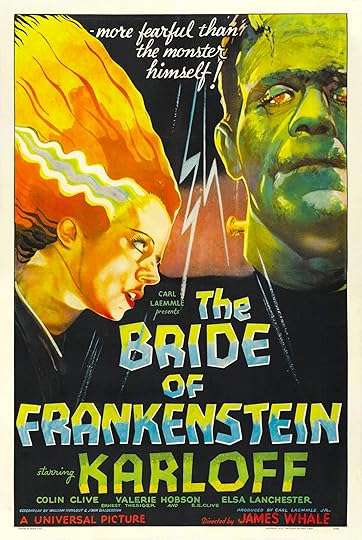 © Universal
© UniversalHow have I never seen this before?! I loved it! It takes everything I loved about the 1931 film—the cinematography, the set design, the costumes, Boris Karloff’s Creature—and cranks it up to 11. Plus, there’s music! A beautiful and haunting score by Franz Waxman. Bride is both a gloriously campy gonzo Gothic sci-fi horror romp and also a much more faithful adaptation of the source material—it actually adapts entire scenes from the novel, even an entire subplot. It also feels more like the novel, if that makes sense, even when it deviates from it. There’s more of a connection to some of the novel’s themes than the 1931 film. The Bride herself is just as iconic as Karloff’s Creature, and even though she’s only in the film for a scant few minutes of screen time, she owns the film. I see why it’s held in such high esteem amongst horror fans and cinephiles—it’s one of the most entertaining monster movies I’ve seen. I can’t wait to watch it again. 4 Stars out of 5.
The Curse of Frankenstein (1957)Directed by Terence FisherPlex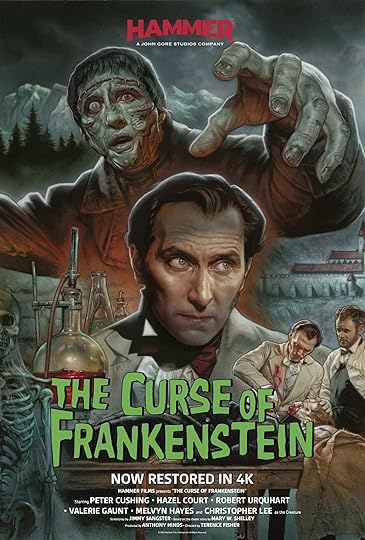 © Warner Bros./Hammer Films
© Warner Bros./Hammer FilmsBaby’s first Hammer Horror film! I’ve been wanting to watch a Hammer Horror for years, considering how highly regarded they are by the horror and film communities, and especially Guillermo del Toro, Tim Burton (Sleepy Hollow), and Robert Eggers (Nosferatu). This is a great Gothic reimagining of Shelley’s novel, focusing more on the character of Victor Frankenstein himself, and his obsessive quest to play God. While veering pretty far from the source material in terms of plot, much like the 1931 film, it really does a great job of portraying Victor’s madness, thanks to an excellent, murderous turn by Peter “Grand Moff Tarkin” Cushing. His creation of his monster is downright unsettling, almost slasher-esque. And the Creature itself is disturbing—given terrifying life by a heavily made-up Christopher “Saruman” Lee. It’s also exquisitely shot and scored, and filled with an aura of dread, which all goes a long way to make up for its faults as an adaptation. 3 & 1/2 Stars out of 5.
Young Frankenstein (1974)Directed by Mel BrooksBlu-Ray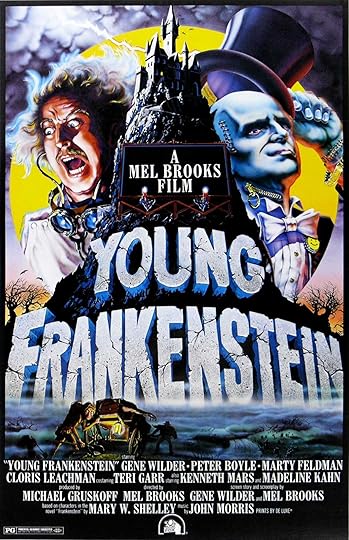 © 20th Century Fox
© 20th Century FoxI adore Mel Brooks movies, so it’ll come as no surprise that I love Young Frankenstein. I hadn’t seen it in some time, so I wasn’t sure how it would still hold up against my nostalgic memories of it, but I’m happy to say it still very much does. It’s a true classic. On top of it being hilarious and endlessly quotable, it’s also impeccably made, a loving, masterful tribute to the Universal Frankenstein films it parodies and to the novel that inspired them all. And I think that’s what surprised me the most rewatching it all these years later: not only is it just a fun, well-made movie, it’s also probably the most thematically faithful to Shelley’s book—it’s all about the relationship between creator and creation, the responsibility the creator has to what they’ve created. 5 Stars out of 5.
What I’m Reading: A Night in the Lonesome October by Roger Zelazny; Feast of the Pale Leviathan by John Chrostek; Inherent Vice by Thomas Pynchon (audiobook).
What I’m Listening To: Private Music by Deftones; Tron: Ares by Nine Inch Nails; Tron: Legacy by Daft Punk.
Signing OffWell, that’s it for October 2025, folks. Hope y’all have a Happy Halloween!
As always, thanks so much for reading, and stay strange.
—Austin
If you enjoyed this newsletter, please subscribe—you’ll get a free eBook of my short story, “Magus,” available EXCLUSIVELY for subscribers!
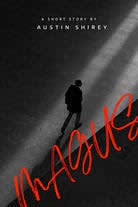
I’d also love it if you considered checking out my weird fantasy noir novella, City of Spores, or my illustrated sci-fi thriller chapbook, Goodly Creatures.
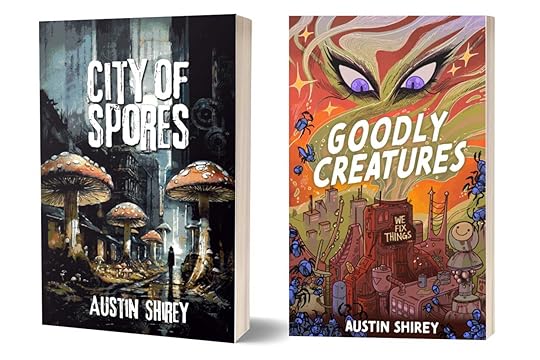
August 27, 2025
Strange & Fantastic #29
Welcome back to Strange & Fantastic, my monthly newsletter where I share updates regarding my writing projects and thoughts on the writing life, as well as sharing book, movie, and music recommendations.
August has been a busy month for me—I took part in the Blend Coffee Bar Book Fair in Ashburn, Virginia on August 9th (thanks to all who came out and came by my table!), went out to Salt Lake City to visit one of my oldest friends for a couple days, and on top of all that and my normal day-to-day stuff, I’ve been working away on draft 2 of my novel, Black Coral (almost done with that, I hope!).
I haven’t shared a short story in the newsletter since sometime before I serialized my novelette “Mushrooms for Mirabelle” (which you can find here if you didn’t get a chance to check that out: Part 1; Part 2; Part 3; Part 4; Part 5; Part 6; Part 7), so I figured it was high time to do that again.
For this month’s story, I wanted to share “Long Distance Runaround,” first published in Haven Speculative Magazine #7 in November 2022, and one of my few forays into science-fiction.
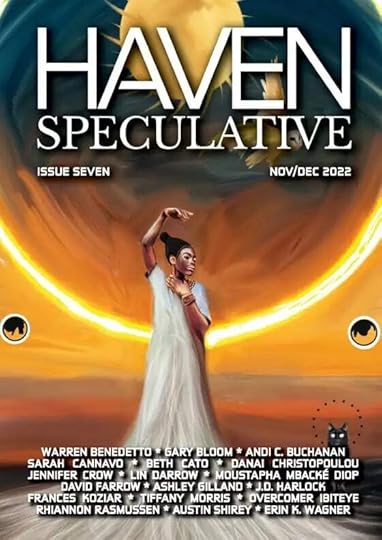
“Long Distance Runaround” actually began life as another sci-fi short story called “Harbinger” that I wrote sometime in late high school/early college. That story was very much inspired by The Stars My Destination by Alfred Bester, which I was obsessed with for a time, and “Harbinger” was my way of paying homage to a book I loved. I ended up not being too happy with “Harbinger” and let it waste away in a drawer, but some of the ideas I’d played around with in that story continued to stay with me, to the point that many years later, I decided to give the story another try. “Long Distance Runaround” is the definitive version of the story I was trying to tell in “Harbinger” all those years ago, and this version mixes my love of Bester’s novel with my love of Philip K. Dick’s work in what I hope is a style and story all my own. I hope you enjoy.
Long Distance RunaroundHave to hand it to the bastards: I think they’ve finally killed me.
No idea how long I’ve been unconscious or how much oxygen is left. This metal coffin’s air is close and stale. I try leveling my breathing—maybe buy myself more time to find a way out—but my jackhammer heart isn’t helping things.
It’s the perfect way to get rid of me: lock me in a dark box, buried gods-know-where, and let me suffocate as I realize there’s no way in hell I can jaunt out.
Bastards.
***
Jaunting works like this: Pull up a mental image of your location. Concentrate on it, along with a clear mental image of your intended destination. Will yourself apart on a subatomic level. Propel yourself through the ether, toward the picture of your destination. When you arrive, knit yourself together again, atom by atom, molecule by molecule, and open your eyes.
***
I can’t remember how old I was when I jaunted for the first time. I do remember my social worker, Mx. Bester, telling me about it when I was ten. Said the officers found me in the crumbled complex my druggie parents had abandoned me in. I was so scared I blinked out of existence and reappeared behind them a moment later.
It wasn’t until I got the file that I learned the whole thing—the memory of Mx. Bester telling me about my past—was fake. Implanted by TriSolar on my inception date. Implanted to help me feel more human. Implanted to keep me from the truth:
I was genetically engineered by TriSolar to infiltrate and sabotage their rival incorps.
I thought I was special.
Until I wasn’t.
***
It’s getting harder to breathe.
Where am I buried? The moon? The red dunes in the shadow of Olympus Mons? An asteroid out past Betelgeuse?
I remind myself it doesn’t matter where.
The ending’s the same.
***
Running corporate espionage jobs was fun in the beginning.
The Boss would bring me into his bright, shiny smartoffice and give me a drivestik containing blueprints and photos of a competitor’s headquarters. He’d name a target and give me a timeframe.
So I jaunted my way into and out of the “most-secure” incorps in the Milky Way, stealing proprietary terraforming tech that would jeopardize TriSolar’s hard-won, galaxy-wide monopoly. Made TriSolar even richer. They’d implement the tech as if it had been theirs all along and shrug off the competitor’s accusations.
I was good at my job.
Great at it, even.
***
I have no idea who slipped the file under my door.
I woke up one morning in my rooms on the penthouse level of TriSolar HQ and there it was on the floor, like some old-school mystery flick. A manila folder filled with actual paper.
What was in the file? My life. Or, more accurately, the elaborate lie that TriSolar called my life:
Born in a biolab. Positronic brainmesh with living gray matter nodes. Miniaturized FTL tech connected to the frontal and occipital lobes. Implanted memo-memes in the medial temporal lobe.
Tech engineered to steal other tech.
***
Air’s thinner.
Blacking in and out.
Not.
Much.
Longer.
***
Can’t remember when I made the decision to run, but I decided to leave TriSolar in ashes.
I threw the Boss from the 97th floor window. Watched with satisfaction as he became a red splotch on the pavement. Barely registered the screams that the Boss’s sudden, explosive appearance elicited from the ant-people skittering along the streets.
I jaunted from one incorp to the next. Leaked a trail of proprietary information. Raided corporate banks as I went, helping myself to enough credits to live comfortably for the rest of my so-called life.
When I finished, I disappeared.
***
They caught up with me on Alpha Centauri.
Guess I should’ve read those files more closely—apparently my 3DNA included a tracking sequence. TriSolar had been tracking me all along. I thought I’d run far enough away that I could breathe a little. Turns out, they’d been waiting for me to make that mistake.
One minute, I’m sitting at my favorite noodle bar in Centauri City; the next, everything goes black.
Like I’d been switched off.
***
A thought surfaces in the dim ocean of my semi-consciousness.
It could work; it probably wouldn’t. Jaunt blind. Hope I don’t end up in a wall or a rock or the cold vacuum of space. The alternative? I could stop grasping at straws and die here. Just lay back and accept what’s coming.
One last instinct to survive stirs in me. To keep pushing forward in the face of assured annihilation. I marvel at this feeling. Such a human instinct, not programmed or taught—innate, inborn, natural.
They can’t strip me of humanity, here at the last. If I die, I’ll die alive.
I shut my eyes. Focus on anywhere but here. Pull myself apart piece by piece. Propel myself through the ether—
***
Colors kaleidoscope.
Time tastes violet.
Space sounds green.
Worlds fold in on each other, blossom like snowspores in the ice gardens of Europa.
Stars fall and melt as planets accordion into past and present, and time arcs back on itself.
Ad astra.
Ad infinitum.
Ad nauseum.
***
My eyelids flutter open, and a group of officers is standing before me. They assure me everything’s going to be A-OK. I’m in an abandoned complex that smells of piss and mold. The air is thin. I’m covered in grime.
My heart stutters like a machine gun as an officer reaches for me, beckoning.
This all feels so familiar. I’ve been here before. I’m younger than I’ve ever been, but somehow I know I’ve never known anything but neglect and indifference.
So I wrap my arms around myself.
Will myself anywhere but here.
Signing OffWell, that’s it for August 2025, folks.
As always, thanks so much for reading, and stay strange.
—Austin
If you enjoyed this newsletter, please subscribe—you’ll get a free eBook of my short story, “Magus,” available EXCLUSIVELY for subscribers!

I’d also love it if you considered checking out my weird fantasy noir novella, City of Spores, or my illustrated sci-fi thriller chapbook, Goodly Creatures.

July 30, 2025
Strange & Fantastic #28
Welcome back to Strange & Fantastic, my monthly newsletter where I share updates regarding my writing projects and thoughts on the writing life, as well as sharing book, movie, and music recommendations.
I’ve been thinking a lot about the word Wonderful lately. According to Merriam Webster, Wonderful is defined as “exciting wonder: marvelous, astonishing; Unusually good: admirable.”
When was the last time you experienced something truly wonderful? Something that “excited wonder” in you, or that was marvelous, or astonishing, or “unusually good” or admirable? It’s a pretty rare thing, these days, I think—especially given the current state of the world. Really, for me, I find Wonderful in my wife and daughters, and that’s about it.
But within the past month I’ve come across two pieces of art that I think can only be described as wonderful: The novel Piranesi by Susanna Clarke, and the movie Superman, written and directed by James Gunn.
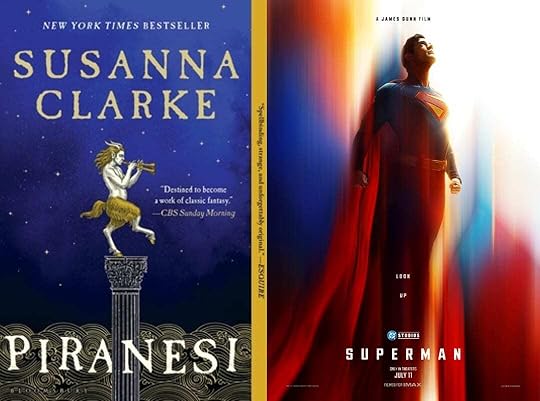
Piranesi and Superman have shown me just how much I’m craving wonder and goodness at the moment, so I thought I’d dedicate this month’s newsletter to both of them and recommend them to you, my dear readers. Because, I’m thinking, maybe you could use something wonderful right now, too.
Let’s start with Piranesi.
Piranesi by Susanna Clarke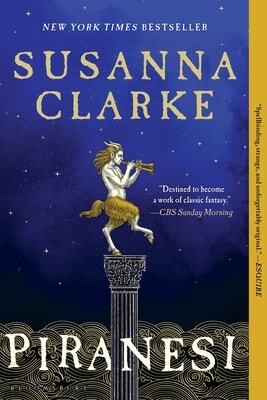
Piranesi is a fantasy novel by Susanna Clarke. It tells the story of a man named Piranesi who lives in a strange world that seems to consist of a massive house filled with endless halls. There’s entire oceans inside this labyrinthine house, and weather, and animal life, and statues. Lots of statues. The only people living in this house are Piranesi himself and another man he simply calls “the Other,” although Piranesi has found evidence of other people existing in the house before him and the Other. Or so he thinks…
Piranesi spends his days exploring the various halls of the neverending house and cataloging them in his journals. He’s endlessly curious about this world he finds himself in, and the way the world works, and he finds so much joy in his exploration and discoveries that it’s hard as the reader not to find joy in reading about them. Piranesi is also a genuinely good character—someone who is curious, open-minded, and above all, kind and respectful, whether it be to the house itself, or to the Other, or to the animals he comes across in the house. And I think that’s the biggest part of what makes this novel so special, so wonderful: the character is just such a truly wonderful character, a wonderful person. Even later in the book when bad things happen, and more is revealed about Piranesi’s past, and what the house actually is, and how he got there, he is still kind, and he never loses his sense of curiosity.
Another part of what makes Piranesi so wonderful is that the story itself “excites wonder.” Clarke does a superb job of creating a multi-layered mystery that pulls the reader in and keeps you engaged through deftly-placed clues, well-executed reveals, incredible world-building, and excellent character work. And Clarke has written the novel in such a way that the reader becomes ravenously curious, much like Piranesi himself, wanting to know more and more about the world of the book and its characters.
Ultimately, Piranesi is a joyous, joyful book that will leave you open to being more curious about the world around us, and the people who cross our paths. I can’t think of many books that do that, and if that’s not wonderful, with a capital W, I don’t know what is.
Superman by James Gunn
Superman was exactly the movie I needed it to be, and exactly the movie I need right now. I’ve been pretty fatigued by superhero movies—and, honestly, superheroes in general—of late, due to their oversaturation in popular culture these past couple decades since Marvel began dominating the box office. I took a long break from reading comics due to that very oversaturation, and have only recently (within the past year or two) really gotten back into them and enjoying them again. That said, when the new Superman movie was first announced, my initial reaction was…meh. I didn’t think another Superman movie would be interesting, or that they could really do anything new. It felt like no one really understood how to do the character justice in live action, and honestly, maybe it was time we just left superheroes to the comics. Then when the first trailer was released, I thought, you know what, this looks like it could actually be good. And then when the next trailer released, I began to hope that maybe, just maybe, it could be great.
Reader, I can happily say—Superman is great. It is, hands down, my favorite Superman movie, and it just might be my favorite comic book movie ever. It’s not a perfect movie by any means, but it is a perfect comic book movie, if that makes sense. It’s the cinematic equivalent, for better or worse, of grabbing a comic book off the racks, opening it up, and jumping right in. It looks and feels like a comic book—it’s bright and colorful, and fun, and action-packed, and funny. Like the best comic book movies (I’m looking at you, Thor: Ragnarok, and you, Deadpool & Wolverine) it leans into its ridiculousness. Most of all—and this is what really got me—it’s sincere. Like, blindingly so.
At its core, Superman—just like its comic book namesake—is about a superpowered immigrant who, instead of using his awesome powers to lord over everyone, chooses to be kind. To find the good in anyone and everyone. To do what he can to make the his adopted homeworld a better place. The Superman of Superman is, like all the very best comic book incarnations of the character, a Superman who stands up for the downtrodden, who embraces empathy, who saves people regardless of geopolitical situations and complexities, who values ALL life—human, animal, or otherwise—and goes out of his way to keep them safe. Superman is an ENTIRE movie built around a genuinely good character who tries his damnedest to do good, to be kind, no matter what. And in this day and age, I don’t have to tell you just how refreshing that is. How wonderful—in every sense of the word—that is. Kindness and genuine goodness really is the new punk rock, and kindness and goodness is what Superman—the movie and the superhero—is all about.
If Piranesi is about retaining one’s sense of wonder and curiosity even when the world is dark and scary and doesn’t make sense, then Superman is about choosing kindness in a world that increasingly views kindness as weakness.
So, if, like me, you’re looking for something Wonderful in these crazy times we live in, I highly, HIGHLY encourage you to check out Piranesi and Superman. I think you’ll love them both.
I know I did.
Signing OffWell, that’s it for July 2025, folks. I’d love to know what you think of Piranesi and Superman if you decide to give them a try.
As always, thanks so much for reading, and stay strange.
—Austin
If you enjoyed this newsletter, please subscribe—you’ll get a free eBook of my short story, “Magus,” available EXCLUSIVELY for subscribers!

I’d also love it if you considered checking out my weird fantasy noir novella, City of Spores, or my illustrated sci-fi thriller chapbook, Goodly Creatures.

June 27, 2025
Strange & Fantastic #27
Welcome back to Strange & Fantastic, my monthly newsletter where I share updates regarding my writing projects and thoughts on the writing life, as well as sharing book, movie, and music recommendations.
This month has gotten HOT. Like, unbearably so. Here in Northern Virginia, stepping outside feels akin to being smothered by a very wet, very hot, blanket. It has not been pleasant, in my opinion, so I’ve been staying indoors as much as I can (which, if I’m being honest, aside from my daily walks, is kinda my natural mode anyway). I can’t imagine what it’s been like for folks in even hotter, more humid parts of the country. *Thoughts and prayers.*
Because it’s been so miserable outside, I’ve been thinking a lot about reading, and how it can be an escape from, say, oppressive weather, or, say, an oppressive regime currently trying to take over our country. You know, stuff like that. *Laugh-cries.*
And thinking about all that has got me thinking about all the books we see or hear recommended, especially those that get near-unanimous praise from every reader, every reviewer, every BookTok or BookStagrammer. Sometimes it feels like we HAVE to read these books that everyone else raves about, because, well, they’re supposedly great books. And sometimes, at least for me, I’ve realized that it can become a sort of chore to read these books, and all of the joy of reading, all of that sense of reading being an escape, goes away, and instead it begins to feel like just another cage. And I think, especially in times like these, where the whole world seems to be be both literally and figuratively burning down around us, it’s more important than ever to remember this:
Read. What. YOU. Like.
I think this is especially hard to remember for authors like myself. There’s some books you hear about that are propped up as must-reads for authors because they can teach you something about the craft of writing. Now, don’t get me wrong—sure, it’s good to stretch yourself, especially as a writer, by reading stuff you maybe wouldn’t normally choose to read, to learn how others have done it, etc., etc. But not at the expense of joy, I think. For example, I’ve heard over and over and over again that Blood Meridian by Cormac McCarthy is INCREDIBLE, and is a must-read, especially for authors. Well, I can’t get into it. I’ve tried and tried, and I just can’t. It doesn’t grab me. Like, at all. Sure, McCarthy’s prose is exquisite—I have read The Road, and loved it, it was much more my kind of book—and he does some interesting things with punctuation and all that, but I’m sure I could find exquisite prose and creative form in other books that I might actually enjoy. In fact, I know I can, because I have. Rion Amilcar Scott does similar things with his punctuation and dialogue as McCarthy, and I find his stories much more interesting to me, personally (his excellent collection, The World Doesn’t Require You, is worth checking out). I have been, and always will be, of the mind that you learn more from something you enjoy doing than something you don’t, because when your heart and mind is all-in on something, I think that’s when the magic happens. That’s why I always had consistent high grades in English, and never Math—one subject I loved, the other I did not.
And that’s not to say that you shouldn’t read books that challenge you—you should. But just because something is challenging doesn’t necessarily mean it isn’t enjoyable. I recently read Franz Kafka’s The Trial for the first time ever a month or so ago, and it was a very challenging read for me—but I absolutely LOVED it. I enjoyed the challenge of reading it. It engaged me the whole way through, as I wrestled with Kafka’s labyrinthine and sometimes meandering narrative. And I think that’s the difference—I was engaged by The Trial. I wasn’t by Blood Meridian. You, dear reader, may not like either of them, and that’s perfectly OK. Don’t feel like you have to read these books that you always see talked about or praised—they may just not be your thing. All of us are different, with different needs, different tastes, different everything. One size does NOT fit all, especially with things as subjective as art.
Reading should be fun. Enjoyable. And in times like these, it should be a safe place, a pleasant escape. So again, I say:
Read. What. YOU. Like.
So what have I been reading? What books have I been escaping into? Well, my wife and I just finished reading the Red Rising trilogy by Pierce Brown (Red Rising; Golden Son; Morning Star), and we absolutely loved it.
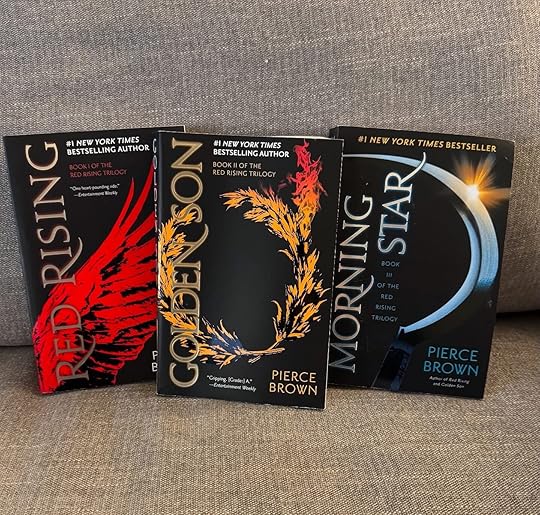
It was SO much fun to read, so entertaining, a perfect escape, in our opinion. If you like Sci-Fi like Dune or The Expanse or Star Wars, I think you’d really enjoy the Red Rising trilogy. These books get hyped everywhere, so you may be a little hesitant to buy into that hype—I know I was—but these books are those rare cases where they actually live up to the hype. At least they did for me and my wife. Your mileage may vary—and you know what? That’s perfectly OK!
After finishing the Red Rising trilogy, I decided to try the Sun Eater series by Christopher Ruocchio, because I’ve seen it mentioned in the same breath as Red Rising, Dune, and Star Wars, and thought it sounded like it was right up my alley. So I picked up Book One, Empire of Silence, and you know what? I couldn’t get into it. For me, it didn’t live up to the hype at all, and I gave up after about 50 pages. But hey, maybe YOU will like Sun Eater and won’t be able to get into Red Rising, and that’s totally cool!
Why? Because:
Read. What. YOU. Like.
OK, a couple more things before we wrap up:
This Saturday, June 28th, I’ll be up at 2nd & Charles in Hagerstown, Maryland, from 2-4pm, signing copies of City of Spores and Goodly Creatures, so if you’re around, please come say Hi—I’d love to see you!
If you missed the monthly serialization of my novelette “Mushrooms for Mirabelle,” you can access it here: Part 1; Part 2; Part 3; Part 4; Part 5; Part 6; Part 7.
I’m trying to be more active on social media, so if you’re on Instagram, give me a follow here, and if you’re on Facebook, give me a follow here.
Signing OffWell, that’s it for June 2025, folks.
As always, thanks so much for reading, and stay strange.
—Austin
If you enjoyed this newsletter, please subscribe—you’ll get a free eBook of my short story, “Magus,” available EXCLUSIVELY for subscribers!

I’d also love it if you considered checking out my weird fantasy noir novella, City of Spores, or my illustrated sci-fi thriller chapbook, Goodly Creatures.

May 26, 2025
Strange & Fantastic #26
Hey there! I hope everyone is doing well. Been a busy month here at House Shirey, both in terms of family life and writing life.
On the family side of things, my wife, Sarah, and I celebrated our 10th anniversary last weekend, so that’s awesome. Can’t believe how quickly time has flown. As cliche as it sounds, it really does feel like it was only just yesterday we were getting married. Now we’re 10 years in, with two incredible little girls. It’s true what they say: Blink, and you’ll miss it. We’re trying our best to not blink so much these days. Unfortunately, all of our anniversary plans fell through because our oldest daughter caught a stomach bug from school, and Sarah caught it as well. *Whomp whomp* Oh well, that’s life! We still made the best of the weekend and enjoyed our time together the best we could considering the circumstances.
New Book in 2026!On the writing side, I’ve got some exciting news: Madness Heart Press, the publisher behind City of Spores, will be publishing my bizarro coming-of-age novella, Pallbearers, in 2026! I’m so excited to be working with MHP again, and I’m so happy that Pallbearers has found such a great home. It’s a weird little book, maybe even weirder than City of Spores, and I was starting to think it wouldn’t find a home anywhere, but here we are, and I couldn’t be happier. I can’t wait to share it with you all!
Unofficial 2025 “Book Tour”I also spent a good chunk of this month setting up a small “book tour” of sorts for Summer and into Fall. Starting at the end of June, I’ll have a book signing event every month through October, although the events for September and October are still being finalized. So, for now, here’s my upcoming event schedule for 2025—I hope I’ll get to see some of you out there!
Saturday, June 28: 2nd & Charles, Hagerstown, MD, 2pm - 4pm
Sunday, July 20: Commonwealth Brewing Co., Fairfax, VA, 11am - 4pm
Saturday, August 9: Blend Coffee Bar, Ashburn, VA, 3pm - 7pm
September: TBD
October: TBD
City of Spores AudiobookJust a friendly reminder that City of Spores is now available as an audiobook narrated by the incredible Kerie Darner! It’s up on both Audible and iBooks. Thanks to everyone who has already grabbed a copy. If you still haven’t grabbed one, you can get it here.
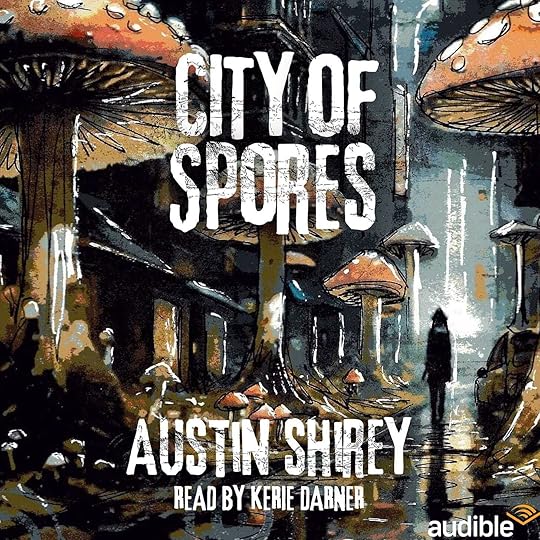
What I’m Watching: Andor (Disney+); Rogue One: A Star Wars Story (Disney+); The Last of Us (HBO Max); Prey (Disney+); Mickey17 (HBO Max); Mission: Impossible - The Final Reckoning (theater); Twin Peaks: The Return (Blu-ray).
What I’m Reading: Morning Star: Book 3 of the Red Rising Trilogy by Pierce Brown; Absolute Superman (DC Comics); Absolute Martian Manhunter (DC Comics); Teenage Mutant Ninja Turtles (IDW Comics); Ultimate Wolverine (Marvel Comics); Invincible Presents Battle Beast (Image Comics).
What I’m Listening To: Vaxis III: The Father of Make Believe by Coheed & Cambria. And all the other Coheed & Cambria albums.
Monthly Serial: Mushrooms for Mirabelle[Read Part 1; Part 2; Part 3; Part 4; Part 5; Part 6]
(Part 7)
The house shook as Mirabelle shut the door behind us. The wood creaked and splintered loudly; the floorboards overhead groaned and shuddered as the thing that used to be our daddy flung itself again and again at the door we’d barricaded.
Outside, over the sounds of Daddy’s tantrum, angry shouts grew louder. Closer.
The floorboards moaned and the thing upstairs roared. I moved to the kitchen window and peeked my head through curtain and glass. Uh-oh…
“What?” Mirabelle asked, frantically searching for anything she could use as a weapon. She had a rusty knife, a pot, a broken floorboard with a nail stuck through it, a fireplace poker, and Daddy’s rifle: nothing which would give her much help for long holding off the mushroom monster upstairs or the angry townsfolk flooding down the road.
She joined me at the window. A ways off, a mob of people poured down our old, abandoned street with torchlight tongues dancing above their heads.
We gotta go, I said.
“But Daddy—”
That, I said, pointing at the ceiling, ain’t Daddy. Not no more.
“We can’t—”
We can’t stay here! They will kill you, Belle. Or that thing upstairs will. We have to go now!
“I hate this goddamned place,” Mirabelle sobbed. “This town, this house, Granny; all of it.”
Me too.
The front door splintered in a cyclone of broken wood and Daddy roared into the house, and I realized in horror that we’d forgotten to board up the window Henry had broken through.
No! I cried, swinging at Daddy, jumping on his back, slipping through every time. No!
Mirabelle screamed and bashed the rifle against Daddy again and again, careful not to break open the black bulb at the end of the stalk growing from his head. His tendrils reached out and coiled around her as the both of them rolled across the floor. She kicked and scratched at him and shoved him toward the fireplace. Daddy hit a corner beam and it snapped in twain, and the chimney collapsed on him as Mirabelle hurled herself away from it, toward the kitchen table.
We could hear the townsfolk on the road. They were almost at the house.
Sobbing, Mirabelle got to her feet, found the oil lamp and screwed the lantern off the bulb of oil. She splashed the oil over the kitchen and fireplace and the rest of the main level.
Daddy roared, heaving beneath the rubble of the chimney as he tried to push it off himself. The tendrils that weren’t severed or wounded whipped about like blind snakes, searching for Mirabelle.
She ran to the window on the other side of the room and used the butt of the rifle to knock out the glass. She grabbed the box of matches from the kitchen table.
“I’m sorry, Daddy,” she said.
Then Mirabelle struck a match and set her world on fire.
THE END.
Signing OffWell, that’s it for May 2025, folks. I hope you enjoyed “Mushrooms for Mirabelle”!
As always, thanks so much for reading, and stay strange.
—Austin
If you enjoyed this newsletter, please subscribe—you’ll get a free eBook of my short story, “Magus,” available EXCLUSIVELY for subscribers!
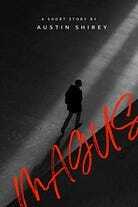
I’d also love it if you considered checking out my weird fantasy noir novella, City of Spores, or my illustrated sci-fi thriller chapbook, Goodly Creatures.
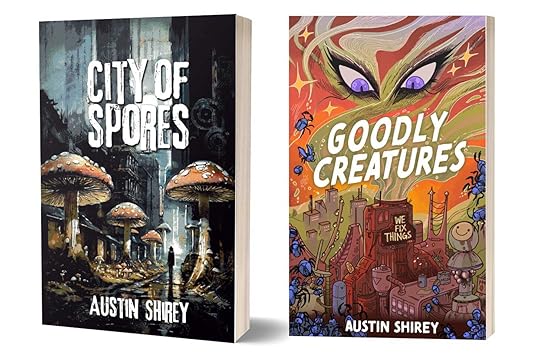
April 24, 2025
CITY OF SPORES Audiobook Available Now!
Hey there everyone! The audiobook for City of Spores is available NOW!
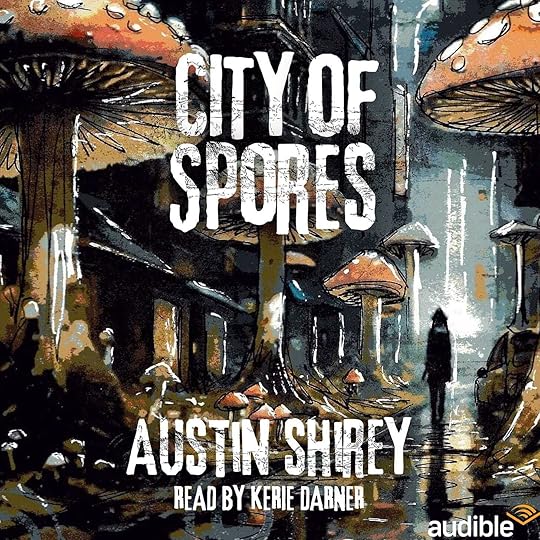
You can find it on Audible here. It should already be up on Amazon, and will also be available on iTunes within the next few days.
I’m so excited for everyone to hear this version of the book—narrator Kerie Darner really breathes life into the characters and story, and I couldn’t be more thrilled about it! I hope you enjoy!
—Austin
P.S. If anyone would like to review the audiobook, please get in touch, and I can provide you with a promo code.
April 14, 2025
Strange & Fantastic #25
Hi all! I hope everyone is doing well and enjoying the April sunshine.
In last month’s newsletter, I shared how much I loved Ivy Grimes’ debut novel, The Ghosts of Blaubart Mansion, which I was lucky enough to read an advance copy of. I’ve always wanted to interview Ivy, and since her novel is releasing on April 21st (next week!), I thought now would be the perfect time to do so. I reached out to Ivy and asked if she’d be interested, and she was!
Real quick, before we get to that, though, I did want to share some quick—and exciting!—City of Spores news. I’m ECSTATIC to announce that the audiobook for City of Spores has completed production and should be available via Audible and iTunes in a week or two!
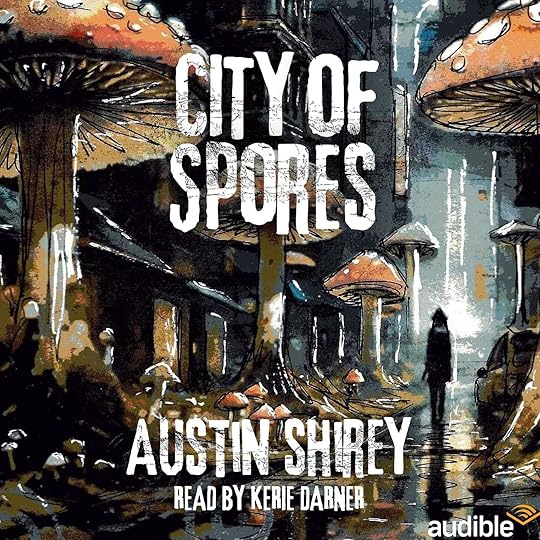
The audiobook was produced and performed by the incredible Kerie Darner, and I can’t say enough great things about working with her. She’s the perfect narrator for City of Spores, and she’s made the city of Madripol and Johanna Kolibrik and all the other characters come absolutely ALIVE. Kerie and I cannot wait to share the audiobook with you—we think you’re going to love it! Now, I know I normally only send one email out a month, but I do want to let you know that I’ll be sending another (short) email out to each of you when the book is up on Audible and iTunes, so please forgive me in advance.
Alright, enough about that—now on to the star of the hour: Ivy Grimes!
Interview with Ivy GrimesIvy Grimes is originally from Birmingham, Alabama, and she currently lives in Virginia. She has an MFA from the University of Alabama. Her stories have appeared in The Baffler, Vastarien, hex, Maudlin House, Cosmic Horror Monthly, Seize the Press, ergot., Potomac Review, and elsewhere. Her chapbook Grime Time is available from Tales From Between. Her collection Glass Stories is out now with Grimscribe Press. Ivy’s debut novel, The Ghosts of Blaubart Mansion, releases April 21, 2025 from Cemetery Gates Media.
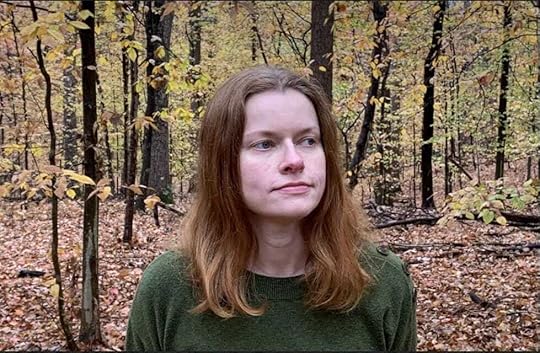 Author Bio and Photo © Ivy Grimes
Author Bio and Photo © Ivy GrimesHi Ivy, thanks so much for doing this interview! Let’s jump right in. What are your 5 favorite books? How have they inspired your own writing?
They change so often! This only counts for today, but here are five that have had a major impact on me since I started writing fiction:
The Wind-Up Bird Chronicle by Haruki Murakami
This was my first big chunky Murakami book (read right after A Wild Sheep Chase, which I also loved), and it made me want to seriously try my hand at fiction. I loved the passive protagonist who goes around collecting his wife’s drycleaning and making simple meals, until he slowly gets caught up in the mystery of her disappearance. I was inspired by how it blended humor and the mundane and the surreal and aspects of a conventional mystery.
The Juniper Tree by Barbara Comyns
I was already a fan of Barb’s when I read this one, which is a hilarious and unusual take on the fairy tale, where the “evil stepmother” speaks, not as a powerful feminist figure, or even as a wholly sympathetic person, but as a resilient and talented woman who’s trying to make ends meet and who makes some unfortunate decisions.
The Brothers Karamazov by You-Know-Who
I didn’t read this one until a few years ago. It’s very long, after all! At some point in school, I read the section where Ivan rejects the idea of God because of the existence of unjust suffering, particularly the suffering of children, for which he says there is no possible excuse. I still believe in God, but I am bothered by these worries quite often, and I write about/around them all the time. I can’t even say, like Alyosha does, that I want to suffer too. I was inspired by Ivan’s boldness and incisiveness, of course, but in the end, I was more inspired by Alyosha’s persistence through weakness, and his insistence on seemingly small matters of kindness and community.
We Have Always Lived in the Castle by Shirley Jackson
I found this hugely influential. Two sisters who love each other, and one pits them both against the world. They’re so isolated in this ambiguous, interesting way. Jackson is funny, and she lets herself be really fanciful here even while she’s hiding the dagger. This book shows off the power and safety and beauty and loneliness and wretchedness of being different. Of living in your own world.
In Watermelon Sugar by Richard Brautigan
Like many of my favorite books, it’s serious and funny. I’m drawn to hippie art, and this book sets us in a surreal sort of commune where we investigate the troubles that keep us from paradise on earth. Acid-tinged imagery. Love the casual first-person voice. I bet it was a total joy to write, and if I’m wrong about that, I’m not sure I want to know.
AND shout out to beloved books like Dubliners, The Big Sleep, Vonnegut stuff, Invisible Man, Piranesi, Sula, The Sea, the Sea, The True Deceiver, Ruth Goodman’s fun history books, The Makioka Sisters, Gingerbread, Excellent Women, etc., etc. I’m also consistently inspired by books and stories that friends have written.
Those are all great answers! I’ve got some new books to add to my TBR. So what was your writing process like for The Ghosts of Blaubart Mansion ? How was it similar to/different from your writing process for your short stories and other novella?
I don’t think too highly of my process at this time! I can’t seem to control my writing intentions the way I’d like. But with The Ghosts of Blaubart Mansion, I wrote the first chapter first, and I was delighted by Ruby’s voice and the characters I met in that chapter. From there, it spun out. I’ve written other novels and trunked them because I didn’t feel the same sense of consistent delight when returning to them. I originally called the book Ruby, Opal, and Phew, a title which no one else liked.
As for short stories or flash pieces or little poems, I tend to write them in little bursts. Whereas novels require the patience of everyday living, a short story can come from a concentration of terror or rage. That’s much more fun in a way, but I haven’t felt like writing short stories lately. Too much comfortable ennui!
I totally get that. And I have to admit, as much as I love the title The Ghosts of Blaubart Mansion, I actually really like the original title, too! Speaking of those characters, besides Ruby and Opal, Phew was my favorite character in the novel. He's so weird and funny, and I love the idea of this little kid prophet wandering around in the woods listening to God. What inspired his character? Do you have a favorite character in the novel, and if so, who is it?
Phew was my favorite, too! He surprised me and made me laugh right away. I think in retrospect, he owes a little of his DNA to Dill in To Kill a Mockingbird, but I didn’t see that until I’d written the novel. I’ve always liked writing funny kids, though. I grew up around extended family in my hometown in Alabama, and all of us kids spent a lot of time with elderly family members, so we had some old person qualities alongside our kid qualities, which is what Phew is like.
That’s a great way of describing Phew—a kid with old person qualities. I know a lot of your writing is influenced by fairy tales—what is it about fairy tales that captures your imagination and/or inspires you as a writer? Do you have a favorite fairy tale, and if so, which one, and why?
You know, I’m still not entirely sure! Whenever I ask myself this question, I have a slightly different answer. I love the various ways artists move in and out of fairy tales as they retell them, exploring their own interests within them. Before I wrote The Ghosts of Blaubart Mansion, I was really inspired by the movie Bluebeard (2009), directed by Catherine Breillat. She switches between retelling the fairy tale of a young wife forbidden to enter only one of the rooms in her husband’s castle, and the frame story about young sisters in conflict.
I’ve also been inspired by reading the psychological analysis of fairy tales by Marie-Louis von Franz. She was primarily a mystic, as I see it. I don’t agree with everything she said, but I find her creativity inspiring. I love the idea that fairy tales are dream maps, something from another world to help explain you to yourself, or help you find your way. In the most immediate sense, I find fairy tales uncanny, and I’m drawn to this feeling. I want more of it.
Oh, I’ve never thought of fairy tales like that, as “dream maps”—I love that idea! I've always loved the dreamlike, surreal—and uncanny, as you said—feel of your writing, and I've always wondered: How do you do that? Is it something that just happens as you're writing, or do you use a specific method to achieve that?
I’m also not entirely sure about this! I honestly think this is what comes naturally from me when I’m in a flow state. When I want to write something more linear and comprehensible, I have to consciously focus my mind on that. When I’m having the most fun, in the most absorbing kind of play, I’m writing out dreams. They make sense to me, though.
Speaking of dreams and the surreal and uncanny, we both share a deep affinity for David Lynch. What do you love about Lynch's work? And how has his work inspired or influenced your own?
Yes, we do! I love to see that in your work as well. I first encountered Lynch’s work in my teens, so it’s been part of my life for a long time. Mulholland Drive was the first movie of his that I watched, and it scared me so much, I slept with the light on for days. I was haunted by the deranged prolonged stares of the characters, the reality of the nightmare behind the dumpster, the love and hate existing in the fractured identity of one innocent-appearing woman. I went straight to the internet to see other people’s theories, too, and I had a lot of fun with that. I love movies and shows that spawn message boards full of wild ideas. Eventually, I watched Twin Peaks and loved its mixture of dread and camp. Fire Walk With Me probably shook me the most and is my favorite movie, taking me into the darkest corners of my mind. Talk about uncanny! I love the scene where Laura is looking at the picture given to her by the horrifying Mrs. Tremond and walks right into it, touching the faded wallpaper and passing through the doorway. I could go on through all of his movies. I love the “lighter” ones too, like The Elephant Man and The Straight Story. I love his mysticism and belief in the power of the unconscious mind. He reminds us we live inside a dream.
Agreed! ( Fire Walk With Me is also my favorite Lynch film, and that scene you mentioned is one of my favorite scenes in the film!) OK, I'm stealing a page from your interview playbook here, because I think it's such a wonderful question, but what question would you like to be asked? (Please answer it.)
“Ivy, why do you enjoy reading indie books in addition to widespread classics?”
I love the variety of perspectives you find, not only in terms of the worldview behind the story, but also in different ways of approaching the art of storytelling, from stream-of-consciousness to explicit realism to a million different dream worlds. Also, I like reading books soon after they were written rather than the years it takes a book to move through traditional publishing. I love the immediacy, the punch to the face. I love the democracy of storytelling, that great stories are all around us. I love your work, Austin, and I appreciate your storytelling kinship! I love meeting other writers who love dreams.
What a great question and answer. Thanks for the kind words—I very much appreciate your storytelling kinship as well, Ivy! Finally, where can readers find your new novel, The Ghosts of Blaubart Mansion , and where can they find out more about you and your work?
You can order The Ghosts of Blaubart Mansion from Cemetery Gates and many fine and not-so-fine online book retailers! If you have any questions or problems finding it, feel free to message me.
To learn more about me, you can visit my ramshackle website www.ivyivyivyivy.com.
Monthly Serial: Mushrooms for Mirabelle[Read Part 1; Part 2; Part 3; Part 4; Part 5]
(Part 6)
Mirabelle woke with a start. I was hovering over her, zipping this way and that, agitated out of my mind. I’d been trying to wake her for several minutes since returning to the house.
She rubbed her eyes and yawned. “What time is it?”
Sun’s coming up, I said, but never mind that. Something bad happened, Belle. Real bad.
Mirabelle sat up. “What?”
She gagged, her eyes watering, and she placed her hands over her nose and mouth. “Ugh! It smells something awful in here!”
I looked at her blankly.
“Oh. You lucky you ain’t smell nothing no more.”
Belle—
“Sorry. What is it? What’s going on?”
Follow me, I said, and rushed for the stairs. Hurry!
“I’m coming,” Mirabelle said, creaking up the stairs behind me, two at a time. I seeped through the door and then she pushed it open and joined me in the room.
I floated over near Daddy.
He lay motionless, blood pooling on the floor where it dripped from his sheets. Fungal shelves had broken through the skin of his neck. Dark mushrooms flowered from his eyes and mouth. They budded from his face, his chest, his arms, his legs, between his fingers and toes. Beneath his pale and bruised skin, pulsing silver streaks branched every which way like a network of glimmering spiderwebs. A stalk grew through Daddy’s head, the black cap on the end swelling and compressing with the black spores I knew were roiling inside it.
Mirabelle couldn’t hold back the sobs that racked her frail, little body. She gasped for breath.
But I wasn’t finished bringing her bad news. Not yet.
Belle, I said.
“What?” Mirabelle asked, voice hoarse. She tore her eyes from the thing in Daddy’s bed.
I motioned to Henry’s empty bed and the broken window.
***
Fyffe was on fire.
We could see towering columns of black smoke rising from the center of town as we raced to Granny’s house. Even there, on the edge of the Wytchwood, we could hear the wails and screams and angry shouts filling the morning air.
We’d barricaded Daddy’s body in his room before leaving for Granny’s. I don’t know why his body didn’t take off like Henry’s, but it bothered me bad. As far as I could reckon, it had something to do with Henry taking the elixir first and with Daddy’s body being so broken. But I wasn’t sure the things living inside him weren’t just pretending to sleep, either.
Mirabelle pounded on Granny’s door; it creaked open on its own.
“Granny?” Mirabelle called.
We stepped into the dark beyond the door when she didn’t answer. The fireplace was cold, like it hadn’t been touched in years. Dust blanketed everything. The weeds at the window were dead and wilted. Behind Granny’s little wobbly table, her mattress lay abandoned.
Mirabelle picked up a folded piece of old paper lying on the table, blowing away the dust that covered it. She opened it and read; a moan escaped her lips.
“No,” she said. “No, please. No…”
What, Belle? What Granny say?
Mirabelle sniffled, tried to calm her shaking so she could read me the letter.
“Mirabelle,” she read, “This town… My sister’s dug her claws deep into it. She like a diseased tick dug into the skin, sucking on the lifejuice of the place and poisoning it at the same time. Sometimes, there ain’t nothing left to be done except to burn the whole damn thing to ash. Signed, Granny.”
Before I could respond, shadows fell over Mirabelle, cast by two figures standing outside the open door.
Oh, no, I said, able to make out their faces before Mirabelle could.
“The hell you doing here, girl?” the taller of the two shadows barked.
“Told you!” the other figure said. “Told you I seen her ‘round here, conniving ‘bout with that ol’ witch!”
“She weren’t no witch!” Mirabelle cried. “She the only person in this town that give a damn about me!”
Belle, I said, aching to do something—anything—to protect my sister.
The tall man stepped into Granny’s house. Mirabelle’s breath caught in her throat when she saw the rifle leveled at her. Then she recognized him.
“Mister Seeley?”
“Knew we shoulda burned what was left of your family in that damned ol’ house,” he said, stepping closer. Mirabelle moved back, edging toward the fireplace. “Knew it come back to haunt us, letting you and your daddy and your brother live on.”
I couldn’t do anything to help Mirabelle. My hands were useless. I was useless.
Belle, I’m sorry—
“Just shoot her a’ready,” the other man said, as he entered the house behind Mr. Seeley.
Mirabelle’s eyes widened when she recognized the second-oldest West boy. They’d been so close before she turned thirteen and everything done gone to hell. “Eustis?”
Eustis West brought his rifle up to his shoulder and aimed at her face. “Henry dead, and her following, mayhap that’ll stop this mess before it get too far gone.”
“Here’s to hoping,” Mr. Seeley said. He aimed down the sight of his rifle.
I’m so sorry…
“No, please,” Mirabelle cried, squeezing her eyes shut. “Please—”
A terrible ruckus pierced the air around us and then silver tendrils were wrapping around Mr. Seeley and Eustis and dragging them both kicking and screaming out of Granny’s house toward the feet of a terrible figure covered in mushrooms.
Mirabelle screamed as another mushroom creature joined the first. We watched in horror as both creatures bent forward and sprayed black spores over Mr. Seeley and Eustis. The spores spread like a black rot over the both of them; they screamed and writhed, gagging as their throats and eyes and ears and nostrils were filled with hungry, black fungus.
The window, I said, catching sunlight glinting off glass across the room. The window!
Mirabelle turned and saw it. She hefted a pot from the fireplace and sent it crashing through the glass in a spray of twinkling quicksilver.
Then she was jumping through the broken window, and we were running, running, running past the stilled bodies of the freshly dead mushroom creatures, even as the bodies of Mr. Seeley and Eustis West began bearing fruit.
TO BE CONCLUDED…
Signing OffWell, that’s it for April 2025, folks. Be sure to grab a copy of The Ghosts of Blaubart Mansion! You won’t regret it.
As always, thanks so much for reading, and stay strange.
—Austin
If you enjoyed this newsletter, please subscribe—you’ll get a free eBook of my short story, “Magus,” available EXCLUSIVELY for subscribers!

I’d also love it if you considered checking out my weird fantasy noir novella, City of Spores, or my illustrated sci-fi thriller chapbook, Goodly Creatures.

March 17, 2025
Strange & Fantastic #24
Winter is almost behind us! I don’t know about you, but I am so ready for some sunshine. This winter has been rough, and for whatever reason, it felt like it’s just dragged on forever. (Thanks a lot, Punxutawney Phil!)
Black CoralSpeaking of a rough winter, I realized I haven’t updated you all about my novel, Black Coral, in a long while. I’m still working on it! I really seem to struggle with writing during the winter months, so progress on Draft 2 has been very slow, but progress has been made nonetheless. With the days getting longer and the sun shining brighter—and me being able to get outside and go for walks without freezing to death!—I feel myself getting more and more creatively energized. I’ve had to do a lot of rewriting from scratch for the first half of the novel, but I’m happy to say that’s almost completely done now: I’ve got one more early chapter to finish, and then I can get to the second half of the book, which will be much more straightforward in terms of revising what’s already there. (Revision is much, MUCH easier—and enjoyable—for me than drafting!) Overall, and despite the struggle it’s been to write, I’m feeling very good about Black Coral, and I can’t wait to share it with you all at some point down the line.
Scares That Care AuthorCon V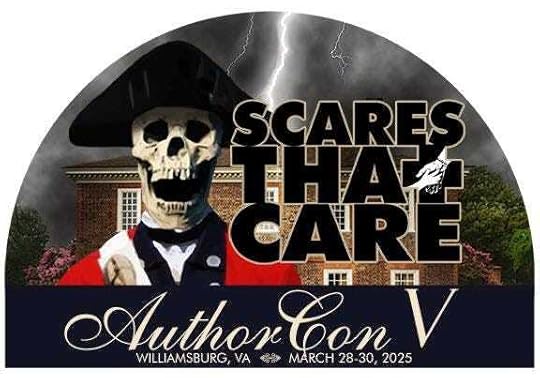
In just a little over a week from now (March 28-30), I’ll be down in Williamsburg, VA for Scares That Care AuthorCon V! I can’t wait to hang out with a TON of other authors and readers. I was at AuthorCon a couple years ago as an attendee, and it was an absolute blast. This will be the first year I’m participating as an author, and I couldn’t be more excited about it. I’ll be sharing a table with my friend and fellow author Zach Lamb, so if you’re at the event, please come by and say Hi! I’ll have copies of City of Spores and Goodly Creatures available for purchase and signing, as well as free City of Spores bookmarks and “Mushroom Noir” stickers. Tickets to AuthorCon are available here.
City of SporesSpeaking of City of Spores, I can’t believe it’s been a little over a year since my weird “mushroom noir” novella was released into the world! Happy belated birthday, little guy!
Thanks SO MUCH to everyone who has picked up a copy and left a review. It’s meant so much more to me than I can put into words, so from the bottom of my heart, Thank you.
And while I can’t say too much just yet, I’ve got some exciting news about City of Spores that I’ll be sharing with you all very soon, so stay tuned!
The Ghosts of Blaubart Mansion by Ivy Grimes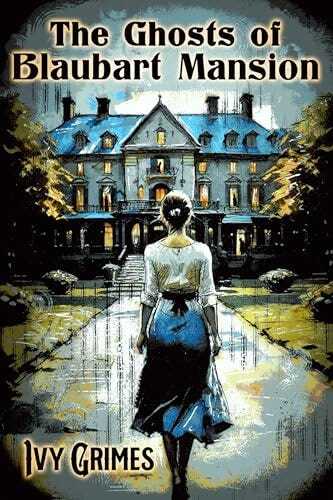
Those of you who read the newsletter and/or follow me on social media know that I’m a HUGE fan of Ivy Grimes. She’s one of my favorite writers, and I’ll read anything and everything she writes. So when Ivy mentioned she was looking for ARC readers for her debut novel, The Ghosts of Blaubart Mansion, I jumped at the chance. And let me tell you—you are not going to want to miss this incredible book! Here’s what I wrote for my Goodreads review:
I’ve loved everything Ivy Grimes has put out, and The Ghosts of Blaubart Mansion is no exception! In fact, it’s my favorite thing she’s done to date—it’s funny, creepy, and unabashedly weird, a perfect distillation of Grimes’ one-of-a-kind mix of the surreal and the absurd, all wrapped up in the guise of a modern Southern fairy tale. I can’t wait to revisit it!
Ivy herself has described The Ghosts of Blaubart Mansion as a “comic fabulist Southern Gothic” inspired by the classic fairy tales “Bluebeard” and “Snow-White and Rose Red". So if you’re looking for something new to read, please do yourself a favor and pre-order The Ghosts of Blaubart Mansion! It releases April 21, 2025 through Cemetery Gates Media. Pre-order here.
Monthly Serial: Mushrooms for Mirabelle[Read Part 1; Part 2; Part 3; Part 4]
(Part 5)
Mirabelle said the black mushrooms—I couldn’t help but think of them as corpse fingers—didn’t smell all that different from the other mushrooms we could find growing in our yard, or the dankest places of the house. She said they smelled earthy and musty, almost sour. It was only after Granny had chopped the mushrooms up and mixed them with herbs and boiled them in her pot to create the sticky, black elixir Mirabelle carried home in a glass vial that they smelled downright putrid, Mirabelle said.
I was only half-listening to her as we walked home from Granny’s with the elixir; I was still worrying over what Granny had said: “Now listen, child. Your daddy and Henry may seem to get worse before they gets better. Could seem like the elixir is killing them, but you gotta trust me, Mirabelle. This the only way for them to heal.”
“Yes’m,” Mirabelle had said.
Then Granny had mumbled over the black goop as she poured it from pot to vial. I couldn’t make out the words, but that bad feeling got worse in my haint-belly. For the first time in Granny’s presence, I spoke, and asked her what she’d said, but she’d only smiled and handed the elixir to Mirabelle.
“Just…praying a blessing, dearie.”
I followed Mirabelle up the steps of our house. The sun had gone down, and the overgrown grass was alive with the clicking, humming buzzsaw songs of insects. Seeing the house like that right then, in the near dark, unlit, abandoned, half-consumed by weeds, it sure looked evil. As evil as what had befallen my family.
You ain’t gotta do this if you don’t wanna, I said, as Mirabelle opened the front door and shut it behind us.
She went to the small oil lamp we kept on the kitchen table, took a match from the matchbox next to the lamp, and lit it. The room shone orange-gold. Daddy moaned loudly upstairs in his room, and we could hear the steady thud-thump-thud of Henry pounding his head against the wall as he rocked perpetually back and forth.
“I wanna,” Mirabelle said.
She climbed the stairs to Daddy and Henry’s room and pushed open the door. Daddy was on his stomach on the floor beside his cot, clawing at the planks, drool dribbling out his mouth.
“Daddy!” Mirabelle cried. She hurried to his side and placed Granny’s elixir on his nightstand before wrestling Daddy back into his bed. He’d soiled himself and his sheets.
When she’d washed him and got him dressed in another pair of clothes and got him tucked in fresher sheets, Mirabelle went to Henry. She pulled him to his feet and guided him back to his bed, where she cleaned and bandaged the back of his swollen, bleeding head with bunches of dirty cloth.
Floating there, watching her, unable to help her help Daddy and Henry, well, I felt as useless as a broken headlamp in a mineshaft.
Mirabelle grabbed the vial from Daddy’s nightstand, then wiped her nose with her arm.
“Ain’t you see?” she said. “This the only way. I can’t… I just… I can’t, Judson. Not no more.”
Whatever you say, Belle, I said. I’m with you. Right here with you.
Mirabelle walked over to Henry and unstopped the vial. She took a deep breath, then lifted Henry toward her and made him drink.
When Henry had swallowed half of the elixir like Granny had said, Mirabelle moved to Daddy’s bed and made him finish the rest.
***
I don’t sleep. Not since I’ve been a haint. I just kind of sit there, floating, hovering, whatever you want to call it, doing nothing, thinking nothing, until there’s something to do or think about. Usually, that happens when Mirabelle wakes up in the morning.
But that night—the night Fyffe went up in flames—I was rousted from my thoughtless haint half-life by the creak of floorboards above us. The sound didn’t wake Mirabelle. She just kept snoring contentedly on her mattress, curled up in her ratty-tatty blanket.
At first, I didn’t think nothing of it. Daddy often groaned and moaned throughout the night, so much so you kind of got used to it. And Henry oftentimes would wake up and get out of bed and go back to rocking in the corner under the window, at least until he got tired again and crawled back in bed or passed out on the floor.
But then, more creaks kept on coming, like the wood was groaning beneath a heavy, shuffling weight. I kept hearing strange noises, too. Wet, gurgling noises that didn’t sound like anything I’d ever heard before.
I moved toward the ceiling, deciding to poke my head through the floorboards into Daddy and Henry’s room to see what was making such a racket. But as I passed through the wood, I heard a mighty loud crash and the shattering of glass, then a heavy thud and scritch-scratch scuffle outside the house.
I pulled myself fully up into the room. Henry’s bed was empty, the window broken, jagged shards of moonlight still dangling from the frame and glistening on his bed.
Then I was rushing out the window, soaring after my brother as he loped and skittered toward town like a spider running upright on two legs.
Henry! I called after him.
He couldn’t hear me, of course; old habits, I reckon.
I should’ve known something was wrong from the start, but it wasn’t until I caught up with him that I was sure it was wrong. That he was very, very wrong.
Henry?
His eyes, the color of his skin, they weren’t right. He was a blossom of bruises and dried blood. The way he moved, like there was something inside him, steering him, it was bad-strange. He shifted in the moonlight and I saw them—fungal growths rippling through his skin from head to toe. A stalk was speared through the top of his head and jutting out his chin, ending in a shiny black cap I swear was moving, like hundreds of things inside it were raring to break free.
He gargled and chittered in a throaty, wet voice, and stumbled toward Main Street.
When Henry rounded onto Main, he burst through the front door of the first house on the corner, splintering the wood like it wasn’t nothing to him, even as it gouged his flesh. His blood dribbled in steady tattoo on the floor. Whoever lived there was up and screaming now, and a man came rushing down the stairs, his wife and several children behind him.
With a loud, gurgling cry, Henry rushed forward.
No! I said.
I lunged at Henry, throwing my arms around him and his many growths, but I didn’t do anything but tickle the air; my arms went right through him.
Henry convulsed like he was full of snakes, and then silvery strands of living gossamer were shooting out from his skin and coiling around the man, forcing the man’s mouth and eyes and nostrils open.
Henry, please, stop! I cried, throwing my arms through him again and again to pull him back.
Then Henry bent his head and the black cap at the end of the stalk burst open as a fountain of black spores erupted from it.
TO BE CONTINUED…
Signing OffWell, that’s it for March 2025, folks.
As always, thanks so much for reading, and stay strange.
—Austin
If you enjoyed this newsletter, please subscribe—you’ll get a free eBook of my short story, “Magus,” available EXCLUSIVELY for subscribers!

I’d also love it if you considered checking out my weird fantasy noir novella, City of Spores, or my illustrated sci-fi thriller chapbook, Goodly Creatures.

February 24, 2025
Strange & Fantastic #23
Happy Twin Peaks Day!
Yes, if you didn’t know, in the classic ‘90s TV series Twin Peaks created by David Lynch and Mark Frost, February 24th is the day FBI Special Agent Dale Cooper (played by Kyle MacLachlan) rolls into the dreamy Pacific Northwest logging town of Twin Peaks to begin investigating the murder of homecoming queen Laura Palmer.
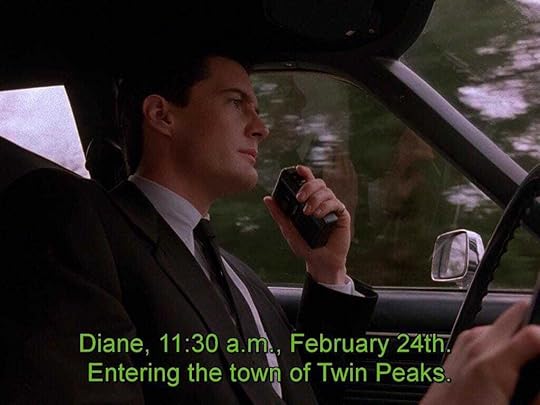 Image © Twin Peaks Productions, Inc. / CBS Studios
Image © Twin Peaks Productions, Inc. / CBS StudiosIn last month’s newsletter, I talked a little about how much David Lynch and his work meant to me in the wake of his death, and mentioned that I think Twin Peaks is the greatest TV show ever (and my personal favorite), so the fact that I sat down to write this month’s newsletter on this particular date is a happy bit of synchronicity. In light of that, I figured I’d take a moment to say a little about why I love Twin Peaks so much.
For me, Twin Peaks is the perfect melding of a detective story with the speculative and the surreal; a heady mix of mystery, dreamy surrealism, supernatural (and all-too-human) horror, and absurd humor that is unlike anything else I’ve experienced. It’s dreamy, it’s mundane, it’s scary, it’s funny, it’s surreal, and above all—it’s heartfelt and compassionate. When I think of David Lynch, and of the term ‘Lynchian’ which is so often used to describe his work, it’s those things that come to mind. To borrow a quote from Special Agent Cooper—one of my most favorite fictional characters ever—I adore Twin Peaks (and Lynch’s work as a whole) because it is “both wonderful and strange.”
I could go on an on about the show, but I’m going to stop myself here. Suffice it to say, if you haven’t checked out Twin Peaks yet, you should. It’s available on Blu-Ray/DVD, and streaming on Paramount+.
Speaking of things both wonderful and strange—you gotta check out this book:
Skull Slime Tentacle Witch Warby Rick Claypool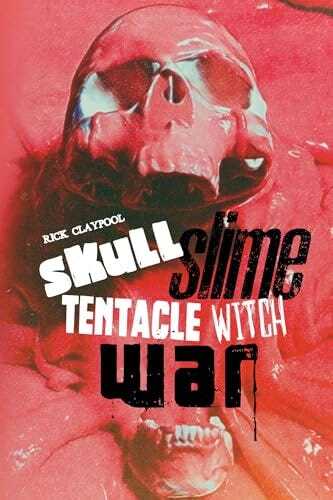
Skull Slime Tentacle Witch War is one of the most original and purely zany books I’ve read (it’s second only to Stepan Chapman’s inimitable The Troika in terms of originality and pure zaniness, in my opinion). It’s balls-to-the-wall CRAZY. And crazy-fun, too. I don’t know quite how to describe it, except that it feels almost like an insane Adult Swim or even Looney Tunes cartoon in book-form. In my Goodreads review, I said it’s “Adventure Time by way of Ren & Stimpy and Smiling Friends with a heaping helping of Nickelodeon slime”—but that’s not even scratching the surface of it or doing it the justice it deserves. If you like mutants and mayhem and all things bizarre, you’ve got to check it out.
Upcoming Event: Scares That Care AuthorCon V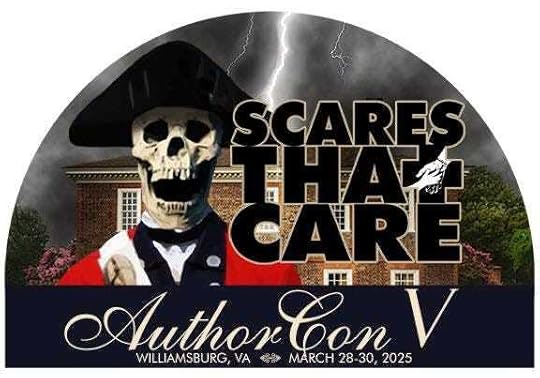
One last thing before jumping into Part 4 of our ongoing serial. I’m excited to announce that I will be taking part in Scares That Care’s AuthorCon V event March 28-30, 2025, in Williamsburg, VA! It’s a great event that connects authors like myself with readers like you, and best of all, it raises money for a great cause. I’ll have copies of City of Spores available for purchase and signing, along with bookmarks and “Mushroom Noir” stickers, so please come say Hi if you can. Tickets are available here.
Monthly Serial: Mushrooms for Mirabelle(Part 4)
When Mirabelle finished her story, she had second and third helpings of stew. I floated behind her, itching to be gone from Granny’s place. After Mirabelle was done eating, Granny rose from her chair, gathered their dishes, and placed them back in the dirt where she’d gotten them. She returned to the table and smiled, first at me, then at Mirabelle.
“Thank you, dearie,” Granny said. “I reckon that was right hard.”
Mirabelle nodded slowly.
“Seems I was right,” Granny said. “Them townfolk ain’t been speaking truth about your poor family. You Crane folk ain’t cursed; just unlucky, I reckon. But, someone somewheres mention a curse, and the whole town acts they worst selves.”
“That happen to you?” Mirabelle asked.
“Mayhap, in a manner. But my sister, well, she were a witch. She were a bad woman, hurt lotsa folk in town, long time ago. When they realized what she were, what she done, they… Well, they hurt her back.”
“Then you ain’t a witch?”
Granny smiled and shook her head. “No, dearie, I ain’t. They treat me like I were, just cause I’m blood-kin with one. They ain’t kill me, but they ain’t have nothing to do with me, neither. Sometimes, that’s the same as killing.”
Mirabelle frowned.
“You acting like you disappointed I ain’t a witch,” Granny said, laughing.
“Reckon I am,” Mirabelle admitted quietly. “But only just a little.”
“Heavens, child! Why?”
Mirabelle shrugged, avoiding Granny’s eyes. “I guess… Well, since you can see and hear Judson, too, I thought that mean I were special, like you. That I could do…things. Mayhap heal Daddy and Henry…”
“Aw, honey child,” Granny said, and she grasped one of Mirabelle’s hands with both of her own. “Seeing haints, speaking to them, that some old magic, sure, but… Well, I reckon it’s what you call small magic. Some folk is just…more aware. Like us. We ain’t powerful; we just good at seeing and listening. Most folk don’t pay no attention to the world around them.”
Tears slipped from Mirabelle’s eyes.
Granny withdrew one of her hands and reached out, pulling Mirabelle’s chin up with a finger. “And I pay more attention than even you, Mirabelle Crane. Mayhap, I reckon I can help your daddy and your Henry. There’s things around us, right here in Fyffe, that I reckon can help them. More of that small magic.”
“Really?” Mirabelle said.
Granny nodded and winked at her. “Just gotta know where to look, is all.”
#
No matter what I said, no matter how many times I said it, Mirabelle didn’t listen to me. I wish I could’ve shared the feelings I got around Granny with her, help Mirabelle to feel the wrongness, the bad strange I felt around the old woman. But the truth is, I don’t rightly know if she would’ve listened to me, even then.
The morning after we’d gone to Granny’s house, after Mirabelle had seen to Daddy and Henry, we set out to the mountain in search of the black mushrooms Granny had told us about.
“They be in the shadow of the mountain,” she’d said. “Down a holler not far from the mouth of the mine, near a much older shaft, long closed up; I reckon it ain’t more than a mound of rocks now. We’ll need a bushel-full of the mushrooms.”
“What if I’s seen by a Company man?” Mirabelle had asked. “They come and take our house, they see me around the mines.”
“Ain’t no chance of that,” Granny had assured her. “You’ll be following an old path through the Wytchwood. It lead right to that holler and right back the way you come. Ain’t nobody gonna see you over that ridge.”
That had been good enough for Mirabelle.
You reckon this gonna work? I asked her again, as we wandered down the path Granny had set us on earlier that morning.
The sun was rising over the mountain, but the ‘Wood was still dark where we were, since we were still in the part of the wood bristling with healthy trees. As we went on though, the trees around us died, and plants became scarce, giving way to dry, dusty earth.
“I do,” Mirabelle said, hopping over a log. The old bushel Granny had given her swung noisily from the rusty iron handle she clenched. “I reckon Granny’s right about that small magic she talk about.”
I reckon talking to your haint brother and making a healing elixir from mushrooms is two very different things, I said.
“Maybe you not as aware then. Like me and Granny.”
I reckon I’m probably more aware than you and Granny combined, seeing as I’m the one that’s all floaty-like.
“Granny learnt all ‘bout healing plants and balms and elixirs from her mama, like her mama learn from hers. Besides, don’t you remember our mama talking about folk medicine when Daddy got hurt?”
Yeah, but Mama ain’t never found nothing to help.
“Mama never went to Granny,” Mirabelle said. “She went to townfolk who reckon Granny a witch cause her sister one. Folk like us, like Granny, you and me, we can’t trust townfolk no more.”
But ain’t you scared, Belle? What if it don’t work? What if it just make Daddy and Henry worse than they already is?
“It’s gonna work. I trust her, Judson.”
But?
“I am scared,” Mirabelle admitted.
Then why—
“Cause!” Mirabelle snapped, stomping a bare foot in the dirt. “I’m always scared, Judson! Been scared every moment of every day since I turned thirteen and… And if it work like Granny say, then… Then…”
Then we have a bit of our family back, I said. And you ain’t haveta be scared no more.
Mirabelle nodded and wiped an arm across her eyes.
Okay, I said.
We continued on in silence. The air grew hot under the morning sun, now that we were surrounded by dead, leafless trees. A while on, we came to a bunch of ruined pines. Beyond them, the ground grew rocky and curved upward. We wandered up the ridge and stopped.
The holler below was wedged between the ridge and the rocky slope that led to the mine’s active shaft on the other side. In the shadow of the mountain in front of us, and the shadows of the dead trees behind us, scores of thick, black mushrooms covered the ground, thicker near the mound of rock Granny had said was probably the old mine tunnel. That old entrance felt rotten to me, like something bad—something evil—was waiting on the other side. I couldn’t be sure, but every now and then it seemed like the black mushrooms shimmered with the same oily dark that shimmered about Granny.
They look like swollen, coal-stained fingers, I said.
Like scores of dead miners beneath the ground were clawing and clambering to be free of their graves.
Mirabelle shivered in the heat as gooseflesh dappled her arms. I shivered too, and I ain’t even got skin.
“C’mon,” Mirabelle said, and she headed down into the holler.
For the first time since I’d come back to her, I didn’t want to follow.
TO BE CONTINUED…
Signing OffWell, that’s it for February 2025, folks.
As always, thanks so much for reading, and please stay both wonderful and strange.
—Austin
If you enjoyed this newsletter, please subscribe—you’ll get a free eBook of my short story, “Magus,” available EXCLUSIVELY for subscribers!

I’d also love it if you considered checking out my weird fantasy noir novella, City of Spores, or my illustrated sci-fi thriller chapbook, Goodly Creatures.

January 31, 2025
Strange & Fantastic #22
Hey there, and welcome to the first newsletter of 2025! I hope everyone had a wonderful holiday season with family and friends—I know I did! It was busy, but great nonetheless.
 The man, the myth, the legend: David Keith Lynch. Photo © Josh Telles.
The man, the myth, the legend: David Keith Lynch. Photo © Josh Telles.I’ve been thinking about director and artist David Lynch a lot since the news broke of his passing on January 15, 2025. I came to the majority of Lynch’s work later in life (within the last two years or so, despite having been interested in Lynch and his work since my teens), and since then he and his films have come to mean a lot to me: no one else, in my mind, can marry the mundane and the surreal, the horrific and the quaint (and the funny!), quite like David Lynch can.
Most of all, the way Lynch approached creativity has been a huge inspiration to me of late. His mantra was to be open to any and all ideas, to follow the ideas where they might take him—he didn’t try to figure them out or place them in the confines of what he thought whatever story he was working on should be, but let the ideas themselves lead. Lynch was an artist who trusted his ideas. This creative free-flow was a massive part of Lynch’s life, and I’m convinced it’s what made his work so special and singular.
I encourage anyone engaged in any creative endeavor (or anyone interested in Lynch and his work) to check out the books Lynch on Lynch and Room to Dream, as they both go into great detail regarding Lynch’s art life. (I started listening to the audiobook of Room to Dream the day after Lynch passed and was excited to find that he narrates whole sections of the book himself; there’s something comforting about still being able to hear his distinctive voice after he’s passed on.)
And if you haven’t checked out any of Lynch’s work (he directed films, painted, recorded music, and wrote books), there’s no time like the present. Might I suggest starting with Twin Peaks? It’s not only my all-time favorite work of his, but probably his most newcomer-friendly. (I will die on the hill that Twin Peaks is the greatest TV show ever; I actually had started rewatching the series a week before Lynch passed—a twist of fate would not have been lost on Lynch.)
So, all that to say: Rest in Peace, Mr. Lynch—and thanks for all the amazing work you left behind for us to enjoy, contemplate, and be inspired by for many ages to come.
Monthly Serial: Mushrooms for Mirabelle(Part 3)
Granny Bigelow’s homestead wasn’t really a house—it was more a pile of old wood and stone topped by a moldering thatch roof. It loomed dark and lonely on the outskirts of town, on the edge of the Wytchwood. Looking at Granny’s place, I could understand why everyone reckoned her a witch: even her home looked the part. But then, our house didn’t look much better.
Mayhap things ain’t always what they seem, Mirabelle thought, as we approached Granny’s door. Sometimes she’d forget I could hear her thinking just as well as I could hear her talking.
Mayhap they’re exactly what they seem, I said.
“I told you, stop listening to my thoughts,” Mirabelle said.
And I told you, I can’t help it.
Mirabelle huffed and raised her hand to knock on Granny’s door, then hesitated.
Even after Granny had left the roast rabbit on our doorstep that first night, and after she’d come again every night after that, leaving food on our porch, Mirabelle still wasn’t sure of the old woman. Neither of us were. It’s hard getting past things you learn as a kid, especially the prejudices taught as gospel truth. Eventually, though, the roast rabbit, the venison stew, and the cooked ground-birds won out.
Granny had kept my sister and daddy and brother from starving to death.
“She’s our last hope,” Mirabelle said, as much to me as herself.
She knocked.
The door creaked open on rusted hinges and there was Granny, peering out from the dim space between the door and the frame. Fire flickered behind her, outlining her in orange and yellow. She smiled.
“Well now,” Granny said, waving Mirabelle inside. “Been hoping you come on by.”
She shut the door behind us.
Inside, Granny’s home was as old and dark as it was outside. The only light besides what came from the fireplace at the back of the room came in through a dirty window at the other side of the house. Bunches of plants lined the sill, with more arranged in the dirt beneath it. They looked like weeds, mostly—not the kinds of plants someone would keep watered and healthy, especially inside their home. Against the other wall, behind a circular wooden table with three legs propped up by pieces of broken shale, sat a dirty mattress topped with a raggedy blanket.
I heard a skittering sound, like tiny nails clawing dirt, and then a black, plump shape hidden among the plants startled and bolted past the fireplace, disappearing into a hole in a far corner behind Granny. It looked like it might’ve been a rat, but I wasn’t sure. Guess maybe my being there spooked it.
Granny made no sign that she’d noticed the critter. Instead, she hobbled over to the fire, stirred whatever was boiling in the pot there, then moved to the table and sat in one of the two chairs. She motioned Mirabelle over.
My belly started feeling sick again, and it got worse anytime I focused on the black oil shimmering around Granny.
Belle, I said, as Mirabelle sat herself at the table across from the old woman, we really shouldn’t—
“Now, now,” Granny said, looking right at me, pinning me to the door with her gaze. “No need to be afeared, my boy.”
Mirabelle stiffened. “You can—”
Granny nodded.
“I thought I were the only one,” Mirabelle said.
Granny waved me over to the table. “I ain’t mean you or your darling sister no harm, child. You’re safe with ol’ Granny. Promise.”
I shook my head and clenched my jaw shut. There was no way I was going anywhere near that woman, especially now that I knew she could see and hear haints.
Granny sighed.
“Sorry about him,” Mirabelle said. “He just protective, is all. And he ain’t met no one but me as can see or hear him.”
“Oh, I understand,” Granny said, smiling at me. The smile made me feel cold-like. Well, colder than normal; I was always feeling cold. She turned her attention back to Mirabelle. “Did you enjoy the food, dearie?”
“Yes’m,” Mirabelle said. “But why’d you do that? Why now?”
“How d’you mean?” Granny said. “You was hungry, so I brung you food.”
Mirabelle shook her head. “No, I know that. I meant how come you brung us food now, but never before? All them other times we was starving. Why d’you care now, all out of the blue?”
“Aw, honey, it ain’t like that. I ain’t never seen you before, is all. Not til that day out in the ‘Wood. I hear about your family, sure, but I hear lotsa things. Can’t believe it all. And since I ain’t never seen you or your family, at least up close, I never knew what y’all were going through. Soon as I seen you in the ‘Wood, seen you underfed and starving, well, I reckoned there must be some truth to what I hear, and I reckoned you need some help. And when you act so scared of me, well, I reckoned I better make clear I only means you good.”
Mirabelle sobbed like a baby. I was about to move from the door, but Granny got up from her chair, knelt before Mirabelle, and pulled her into her arms. Mirabelle just cried harder and louder with Granny’s arms around her.
“Aw, now, honey,” Granny whispered. “Aw, now, baby girl. It’s okay, now. Granny got you. Just you cry, child. Just you cry. Granny got you. Granny got you now.”
Belle, I said, aching something fierce to reach out and hug my sister, but a look from Granny froze me in place.
After a while, Mirabelle’s crying became sniffling and she stopped shaking. Granny pulled back and wiped hair from Mirabelle’s face, leaving dark smudges from her dirty fingers. I worried some of her oily shimmer might get on Mirabelle, but I reckon it don’t work like that.
“Now, child,” Granny said. “What say you tell ol’ Granny your story while she fix us some supper, huh?”
“What story?” Mirabelle asked.
“Your story,” Granny said. “You and your family’s. I only hear what the townfolk say, and Lord know if that true. I wanna hear you tell it, in your own words. The truth, dearie.”
“The truth?”
Granny nodded and got to her feet. She turned to the pot and ladled stew into two earthenware bowls she kept stacked in the dirt next to the fireplace. With her back turned, I finally got up the courage to join Mirabelle. I hovered behind her chair, peering over her shoulder, always eyeing Granny.
Granny returned, placed two steaming bowls of stew on the table, and sat down.
Belle, I said. Don’t—
“Shush,” Mirabelle said. She took a deep breath, and told Granny our story.
***
It all happened after Mirabelle turned thirteen.
The week after her birthday, Daddy had the accident in the mines that left him crippled, scarred, and in excruciating pain.
Six months after that, Mama lost her mind. She drowned baby Florabelle in a washbucket, slit my throat when I tried to stop her, then hung herself in the Wytchwood by her own apron; I was only eleven and three-quarter years old. I don’t rightly know why Mama only went after me and Florabelle; I reckon maybe she figured Mirabelle and Henry were old enough to hold her off, mayhap overcome her. Mayhap they were her favorites, I don’t know.
I try not to think on it much, truth be told.
I can tell you though, dying was mighty strange. Suddenly you’re there, then you’re not, then you’re wandering through the hills and woods, only a shadow of yourself, solid things passing through you like you’re nothing but a cloud, then you’re falling through the ground or floating above it, always floating. No sense of direction or smell or touch, head full of jumbled thoughts and hazy, half-remembered memories. It took me a good, long while to find my way back home, back to Mirabelle.
Before I returned home, and after Mama went crazy, Henry—he’d been working in the mines in Daddy’s place—up and disappeared. Search parties looked all over for him beneath the mountain, but they didn’t find any sign of him. Three weeks later, he showed up in his old bedroom, rocking back and forth with spikes of coal driven into his ears. He’d stabbed himself deaf, and he ain’t never uttered a word since.
By the time Mirabelle was fourteen, our neighbors had all left for the Granger Mining Co. houses on North Street, afraid that whatever curse had stricken our family would spread to theirs next. The Wests and the Seeleys, the neighbors on either side of our house and the ones we always reckoned as extended family, were the first to leave. I think that just about killed Mirabelle.
In time, our house was the only one left haunting Old East Street. Weeds and vines, insects and vermin, they replaced our neighbors. The house began falling apart, our family’s misfortune writ large in rotting wood.
No one helped Mirabelle. If they saw her around town, they’d just treat her like a leper, a pariah.
No one cared about the Cranes no more.
TO BE CONTINUED…
Signing OffThat’s it for January 2025.
As always, thanks so much for reading, and stay strange. (Now, seriously, go watch Twin Peaks!)
—Austin
If you enjoyed this newsletter, please subscribe—you’ll get a free eBook of my short story, “Magus,” available EXCLUSIVELY for subscribers!

I’d also love it if you considered checking out my weird fantasy noir novella, City of Spores, or my illustrated sci-fi thriller chapbook, Goodly Creatures.




